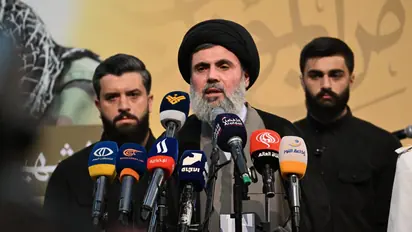Who is Hashem Safieddine, head of Hezbollah's political bureau and likely successor to Hassan Nasrallah?

Synopsis
In the wake of the reported assassination of Hezbollah leader Hassan Nasrallah by Israeli airstrikes, attention has turned to Hashem Safieddine, who is widely viewed as the likely successor to Nasrallah.
The Israeli military announced the killing of Hezbollah leader Sayyed Hassan Nasrallah following a series of strikes on a southern suburb of Beirut. The Israel Defense Forces (IDF) stated that the operation targeted Hezbollah's underground headquarters in the Lebanese capital. This declaration was made on Saturday morning, after overnight speculation regarding Nasrallah's status, who has been at the helm of Hezbollah for thirty years.
Sources in Israel revealed that the security cabinet had previously reconsidered plans to eliminate Nasrallah but, upon learning that he was scheduled to attend a meeting at the command complex, approved a mission to take him out. Israeli media reported that the assassination was executed by a squadron of F15I jets armed with bunker-busting bombs.
The news was initially broken by the military spokesperson Lt Col Nadav Shoshani in a brief post on X saying: “Hassan Nasrallah is dead.”
In a statement released shortly thereafter, the IDF confirmed that Nasrallah had been killed alongside Hezbollah's southern front commander, Ali Karki, and several other commanders who were present at the meeting.
“Following precise intelligence from the IDF and the Israeli security establishment, IAF [Israeli air force] fighter jets conducted a targeted strike on the central headquarters of the Hezbollah terrorist organization which was located underground, embedded under a residential building in the Dahieh area of Beirut,” the statement said.
In the wake of the reported assassination of Hezbollah leader Hassan Nasrallah by Israeli airstrikes, attention has turned to Hashem Safieddine, who is widely viewed as the likely successor to Nasrallah.
As the head of Hezbollah's political bureau, Safieddine is not only a prominent figure within the organization but also a pivotal player in the group's future direction, especially in the context of escalating tensions between Hezbollah and Israel.
Who is Hashem Safieddine?
Hashem Safieddine has been an integral part of Hezbollah's leadership for many years, overseeing the group’s political strategies and operations. He is recognized for his experience and capability in navigating the complex political landscape of Lebanon, where Hezbollah wields significant influence. Safieddine is also a member of Hezbollah’s Jihad Council, a body responsible for coordinating military actions and strategies against perceived enemies, notably Israel.
He is closely related to Nasrallah, being a cousin, and carries a notable religious pedigree, wearing the black turban that signifies descent from the Prophet Muhammad. This heritage not only enhances his standing within the organization but also among Hezbollah’s Shia constituents, who view lineage as a crucial aspect of leadership.
According to Philip Smyth, an expert on Shi’ite armed groups, "A new leader will have to be acceptable within the organization in Lebanon but also to its backers in Iran."
The Time of Israel reports quoting sources close to Hezbollah that Safieddine widely regarded as Nasrallah’s heir was still alive after Friday's attack.
The US State Department designated Safieddine as a terrorist in 2017. In June, he issued a warning of significant escalation against Israel following the death of another Hezbollah commander, stating at the funeral, “Let (the enemy) prepare himself to cry and wail.”
Check the Breaking News Today and Latest News from across India and around the world. Stay updated with the latest World News and global developments from politics to economy and current affairs. Get in-depth coverage of China News, Europe News, Pakistan News, and South Asia News, along with top headlines from the UK and US. Follow expert analysis, international trends, and breaking updates from around the globe. Download the Asianet News Official App from the Android Play Store and iPhone App Store for accurate and timely news updates anytime, anywhere.